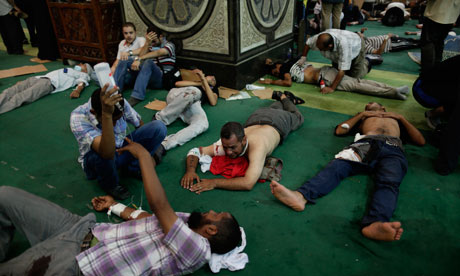Egyptians grieve for loved ones as massacre continues
Egypt's mosques transformed into surgeries as further Morsi supporters become victims of bloodbath at hands of police

Egypt's mosques become makeshift operating theatres, with green prayer-mats being used as beds. Photograph: Hassan Ammar/AP
Tears streaking down his face, Ahmed al-Sheikh let out a long howl as his legs gave way beneath him. "My brother," he screamed, as a passerby caught his body before it fell to the floor. "My brother."
Al-Sheikh's brother, Mohamed, was lying motionless a few feet away on the floor of central Cairo's al-Fath mosque – shot dead by police in the third day of deadly violence to grip the Egyptian capital.
Heavy gunfire rang out in the fiercest street battles in the city since the security forces launched their bloody crackdown against supporters of ousted Islamist president Mohamed Morsi on Wednesday. Military helicopters hovered overhead as supporters and opponents of the Muslim Brotherhood clashed in the streets below.
At the time of Mohamed's death, 19 other protesters lay dead next to him. Later, others would count at least another 25 corpses – making a total of 45, with the death toll likely to rise significantly. Across the country on Friday the death toll from clashes rose to at least 60, with 52 civilians and eight police officers killed, security officials told Associated Press.
At Ramses Square in central Cairo the bodies were piled up on the green – and later bloodstained – carpet of the al-Fath mosque. Earlier, after midday prayers, thousands of pro-Morsi supporters had gathered nearby to protest the state-led massacre of hundreds of their friends at two pro-Morsi camps on Wednesday, in what the Muslim Brotherhood had styled as a "day of rage".
Within hours, they were themselves the victims of yet another bloodbath at the hands of police – the second massacre of Morsi supporters in three days and the fourth in the six weeks since the army ousted Morsi on 3 July.
"We didn't expect this after the killing and the burning of the bodies at the camps," said Dr Anas Awad, a protester and off-duty medic who had rushed to the Ramses Square mosque to offer his expertise. "We thought at least they would leave some time to grieve."
Next door, grieving had already begun again. Mohamed Abdel was kneeling at the knees of his friend, Mohamed Said, shaking with sobs. Moments earlier, Said – shot in the back – had been conscious, lying against a pillar. Then his head slumped and doctors rolled his eyelids shut. Minutes later, he was lying in the line of corpses in the next-door room.
"Does [General] Sisi want to kill us all?" asked Mohamed Abdallah, a 46-year-old accountant sitting nearby – shot in the arm, he said, by a live police round.
"I don't have words for them," said Awad, of the police who attacked them and the army-backed regime that has justified the brutal crackdown. "History and God and Egypt will judge them."
It was a hellish scene at the mosque. Every spare patch of floor became a makeshift operating theatre. Green prayer-mats were beds, tables were used as stretchers, while those already treated – blood drenching their shirts – sprawled against the walls at the side. In the absence of anaesthetic, someone ran around distributing grapes. Elsewhere, there was a team dedicated to resuscitating the unconscious.
A woman who had come for the day from Menoufiya province, squatted in a corridor, crying hysterically. "My brother and his family came today from Menoufiya," sobbed Nagwa el-Qilani, clutching a Qur'an, "but I can't find them and I don't know if they are alive."
The mayhem at the mosque was in many ways one of nightmarish deja-vu for many of those present. Dr Hisham Ibrahim – the surgeon who ran the field hospital that dealt with casualties at Rabaa al-Adawiya, one of Wednesday's cleared camps – was again in charge at al-Fath on Friday.
Speaking on the imam's megaphone, Ibrahim issued directions, ordering the injured, who arrived at a rate of one a minute, to one section of the sprawling building, corpses to another, and deliveries of donated medical supplies to a third corner. He later asked for donations of blood.
How the fighting began remains unclear, and – as usual in post-Morsi Cairo, where truth has become a rare commodity – there were conflicting accounts. Television footage showed some armed and masked men among Friday's 28 pro-Morsi marches to Ramses Square. But who fired first was unclear. Several protesters said their vast majority were peaceful; that it was the police who first trapped the marchers and then opened fire.
"We were walking on 6 October Bridge [a flyover]," said 25-year-old doctor, Mohamed Ahmed Abdel Salem, who approached the central Ramses Square from west Cairo. "Just 200m before we got there, police cars came up behind us and started firing on us, and so did people from the police station to the left of the bridge. It was like a trap.
"They started with teargas and then real bullets. People started falling. Other people tried to carry them on motorbikes, but they couldn't get anywhere because they were trapped. Some used planks or the plastic sides of the bridge to cover themselves, others threw stones at the police station."
Salem's group managed to reach ground-level via a ramp and said police continued to fire at them from behind as they scrambled for safety. He admitted the presence of armed men among the protesters but distanced himself from their actions.
"Of the 2000 people there, maybe only two had guns but they had masks, and no one knows who they were. And the police fired first," Salem insisted.
A witness at another march, who was not a supporter of either Morsi or the army, told the Guardian that some of the marchers did have weapons but only used them after local residents in an area of west Cairo started firing on them. Inside the mosque, doctors were in no doubt that the police had used little restraint. "They were shooting to kill," said Dr Mahmoud el-Hout, secretary-general of the medical syndicate in Sharqiya province and one of the protesters. "We were expressing our opinions peacefully, and they intended to kill us."
Arriving at Ramses Sq shortly before the shooting started, The Guardian saw teargas fired on protesters who were armed only with rocks. A helicopter later hovered overhead with its door open – and several witnesses reported that soldiers inside were firing on protesters.
Medics also reported being attacked while treating patients. "I was treating people on the bridge," said el-Hout's son Omar, also a doctor. "Then there was a volley of shots. I got down, and I realised I had been hit in the chest by shotgun pellets."
As night fell and the new curfew – enforced on Wednesday to contain the violent protests after the massacres – approached, the medics feared further attacks on the al-Fath mosque.
"After they finish outside," said el-Hout, "they will come in here and arrest all the wounded. I can believe anything of these criminals. They're not humans. They're animals."
Elsewhere in Cairo, many pro-army Egyptians – protesting at counter-demonstrations – launched similar vitriol at Morsi's supporters, in an indication of Egypt's deep divisions.
"They weren't peaceful," said Rabia Farahat, a 30-year-old plumber. "They had weapons, they attacked churches. I support the army against them. If I'm a soldier and someone attacks me, I'm going to fight back."
But Morsi's loyalists, a dwindling minority in Egypt, vowed that their fight would go on. They compared this week's protests to the 2011 revolution – a reference that will anger the majority of anti-Morsi Egyptians, who see themselves as the guardians of the goals of the uprising that overthrew Hosni Mubarak.
"We don't know right now what will happen next," said Noha el-Guindy, a 24-year-old office manager, as the shooting started up the road. "But we will continue to go out in the street as we did in 2011. We resisted then, and we will resist again."

কোন মন্তব্য নেই:
একটি মন্তব্য পোস্ট করুন